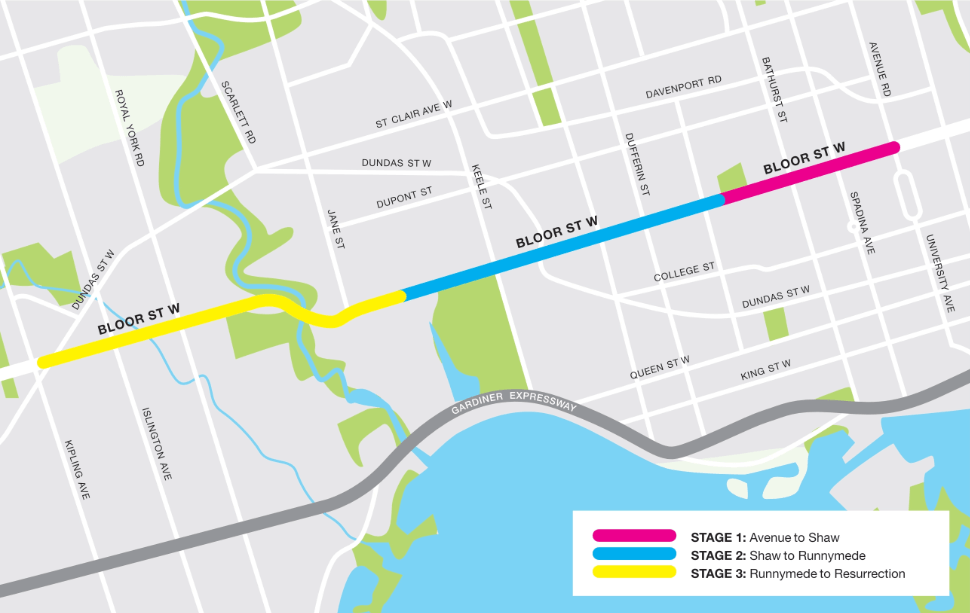AN ONGOING BATTLE OVER THE BLOOR STREET BIKE LANE
FROM JUNE 2023 ISSUE OF WEST END PHOENIX
by Daysha Loppie

As a motion to extend the lane through Bloor West Village reaches council, a rogue group has emerged, pushing to see the protected lane dismantled
Bloor Street West has become a battleground in the ongoing fight for safer streets, and one of its main contenders is Albert Koehl.
On the front lines for more than 15 years, Koehl is an organizer at Community Bikeways Coalition (CBWC), the volunteer group advocating in favor of a Bloor Street West Complete Extension, which aims to install permanent bike lanes from Runnymede to Resurrection Road, just west of Islington Avenue. On June 5, the municipal Infrastructure & Environment Committee (IEC) voted in favour of the initial phase, meaning the motion will have gone to a council vote on June 14, shortly after this [print] issue went to press.
Meanwhile, an opponent has emerged, going head to head with Koehl’s group: An organization called Keep Toronto Moving (KTM) – whose members’ names are not known and who didn’t reply to WEP’s requests for interviews – is pushing for the removal of bike lanes on Toronto’s busiest streets.
Koehl’s work began with Bells on Bloor back in 2007, which held “pedal-powered parades” from High Park to Queen’s Park till 2016.
It was that cycling group that in 2014 sent a letter signed by local residents’ associations calling for a pilot bike lane on Bloor to several city councillors.
Two years later, the city installed the Bloor Street West Bikeways pilot and adopted the Cycling Network Plan to connect bike lanes on major roads across Toronto.
The pilot’s results led council to permanently install bike lanes on Bloor Street between Avenue Road and Shaw Street in 2017. Another segment was installed from Shaw Street to Runnymede Road in 2020 and 2021.
In 2020, Bells on Bloor joined forces with other cyclist advocacy groups and became the CBWC.
“We want to move people in a way that’s efficient, good for the environment, healthy and affordable,” says Koehl of the group’s mandate.
“The city’s public consultation survey shows 75 per cent of respondents agreed or strongly agreed that the Bloor West extension would improve safety and comfort for travellers”
The results of the city’s public consultation surveys show 57 per cent of respondents agreed or strongly agreed that the Bloor West extension would improve safety and comfort for travellers.
Before the pilot, only 12 per cent of women interviewed said that they would feel safe cycling along Bloor, according to an Economic Impact Study by the city. After the pilot, public perception of the area’s safety more than tripled. The number of women and older adults cycling along Bloor Street increased by 91 per cent and 69 per cent respectively. Overall, the report showed that more visitors travelled to the area after the lanes were installed.
KTM prefers to cite its own research. Its website states that a “majority” (63 per cent) of Torontonians believe the city should move dedicated bike lanes off major roadways. This is according to a poll they conducted using Discover, a data collection service offered by the research firm Navigator.
Community members have critiqued the poll for its small sample size and methodology; 501 residents were contacted through an online poll.
The group’s key complaint is traffic congestion, which KTM blames on “badly executed” bike lanes.
Research shows otherwise. The Canadian Automobile Association’s (CAA) report on traffic congestion solutions shows that collisions are the main cause of congestion, rather than construction and poor infrastructure.
“We have seen these arguments painstakingly refuted with good research over a long period of time,” says Koehl.
The extension, if approved, will not require major road reconstruction. It’ll be installed with simple materials such as bollards, road paint and planters in two phases, according to the city’s website.
While critics are concerned about the impact of bike lanes on businesses, the report shows that businesses around the piloted bike lanes saw an increase in customers. CBWC also received 65 signatures from businesses along Bloor West in a 2022 letter they wrote in support of the extension.

“This is about so much more than the bike lanes,” said Koehl. “This is about trying to make our roads safe for everyone.”